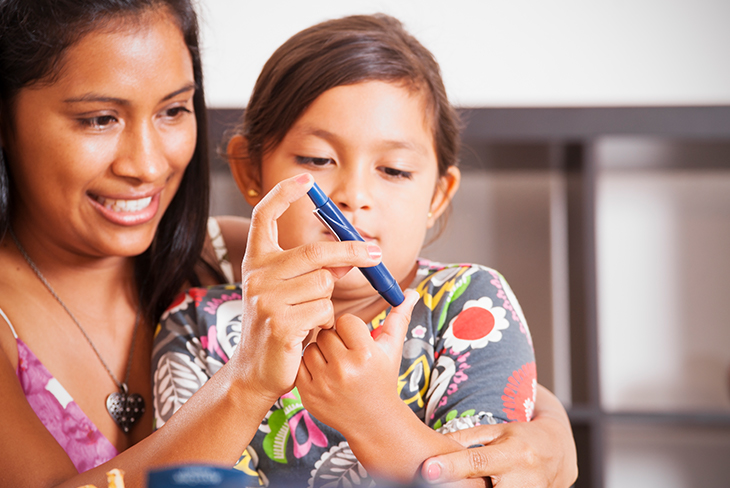Diabetes and the family

Over 425 million people are currently living with diabetes worldwide. According to Margot McCumisky, National Manager for Diabetes South Africa in the Western Cape, 3.5 million of those are South Africans. ‘There may be many more who are undiagnosed, as many people do not experience, or do not recognise diabetes symptoms,’ explains Margot.
What is diabetes?
Diabetes is a chronic disease that can be treated but not cured. The disease develops when the pancreas is no longer able to produce the hormone insulin, or when the body can’t properly use the insulin it produces. Dr Wayne May, an endocrinologist at Life Kingsbury Hospital, explains the four main types:
1. Type 1 diabetes develops in patients with certain genotypes, who then encounter a secondary hit, such as a viral infection. None or very little insulin is produced by the body.
2. Type 2 diabetes develops due to poor lifestyle choices and is driven by obesity. The body is resistant to insulin and this is coupled with less insulin being produced over time.
3. Gestational diabetes is specific to pregnancy and is usually limited to gestation.
4. There are other types of diabetes that develop from hormonal causes, pancreatic problems or infections, or are drug-induced or genetic, and some are immune-medicated forms.
South Africa is seeing a steady increase in type 2 diabetes, which is linked to obesity, a sedentary lifestyle and poor lifestyle choices such as smoking and excessive consumption of alcohol.
Diabetes and the family
The focus of World Diabetes Day on 14 November 2018 and for 2019 is the family and diabetes. It is aimed at promoting the role the family unit plays in the management and prevention of diabetes, care of diabetics and education about diabetes. Like any chronic illness, diabetes has a significant impact on the family, and experts agree that self-management is the most important part of a diabetes treatment plan. This is when family support becomes critical.
‘In a newly diagnosed patient who is probably feeling quite overwhelmed by the diagnosis, we will discuss what diabetes is and how it can be managed,’ says Dr Tracy van Rensburg, a diabetologist at Life Kingsbury Hospital. ‘We will put together a diabetes plan for the patient and explain why they need to keep to the plan. We have a staggered approach – it’s a lot to take in – and we don’t expect anyone to change overnight.’
Any family can potentially be affected by diabetes, so an awareness of the signs of diabetes and risk factors for all forms of the disease in order to detect it early is vital. Chronic care of any illness can mean added responsibilities for the family unit, as is the case with diabetes, which requires insulin injections, daily monitoring, regular exercise and a stringent diabetics' diet plan.
Signs of diabetes
Some of the diabetes symptoms could include:
- Unusual thirst
- Frequent urination
- Unusual weight loss
- Extreme fatigue or lack of energy
- Blurred vision
- Frequent or recurring infections
- Cuts and bruises that are slow to heal, boils and itching skin
- Tingling and numbness in the hands or feet
Since many people with type 2 diabetes may show no symptoms, it’s important to have your glucose levels checked as part of regular screenings, particularly if you have a family history. Diabetes is a serious condition, which can cause permanent damage to the organs if it’s undetected, but you and your family can manage it as a team by lending the appropriate support and encouragement.
Learn more about diabetes at www.diabeteslife.co.za and www.diabetessa.org.za
The information is shared on condition that readers will make their own determination, including seeking advice from a healthcare professional. E&OE. Life Healthcare Group Ltd does not accept any responsibility for any loss or damage suffered by the reader as a result of the information provided.

